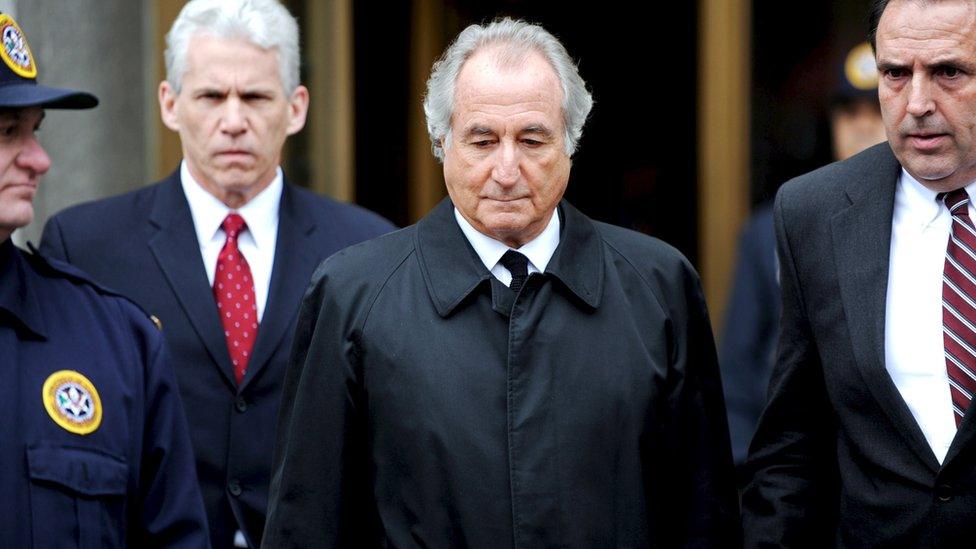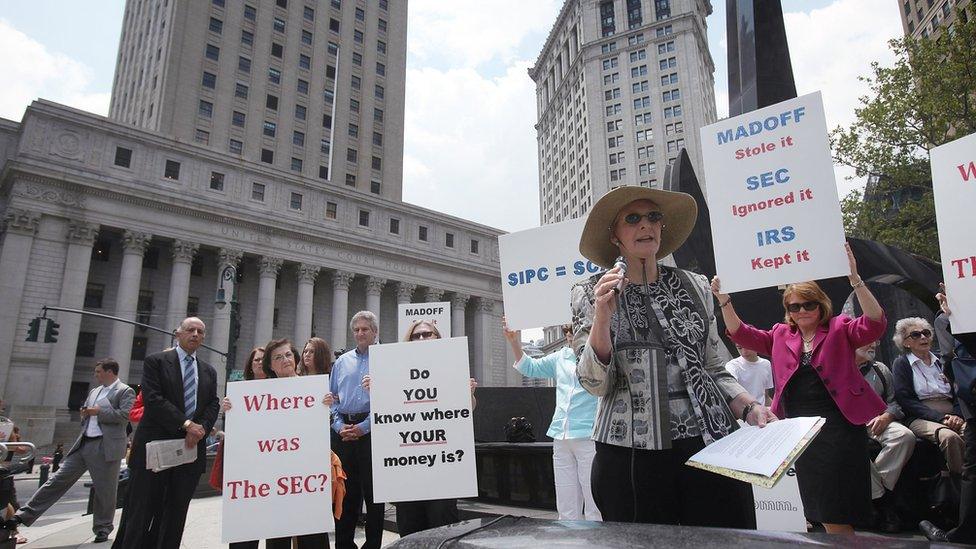Bernie Madoff: Disgraced financier dies in prison
- Published

Bernie Madoff, a Wall Street financier disgraced after he admitted to one of the biggest frauds in US financial history, has died in prison at age 82.
His death was announced by the Bureau of Prisons.
Mr Madoff had been serving a 150-year sentence after he pleaded guilty in 2009 to running a Ponzi scheme, which paid investors with money from new clients rather than actual profits.
It collapsed during the 2008 financial crisis.
"Bernie, up until his death, lived with guilt and remorse for his crimes," his lawyer Brandon Sample said in a statement.
"Although the crimes Bernie was convicted of have come to define who he was - he was also a father and a husband. He was soft spoken and an intellectual. Bernie was by no means perfect. But no man is."
Exceptional returns
Mr Madoff,the son of European immigrants who grew up in New York,set up his eponymous firm Bernard L Madoff Investment Securities in 1960.
The company became one of the largest market-makers - matching buyers and sellers of stocks - and Mr Madoff served as chairman of the Nasdaq stock exchange.
The firm was investigated eight times by the US Securities and Exchange Commission because it made exceptional returns.
But it was the global recession which effectively prompted Mr Madoff's demise as investors, hit by the downturn, tried to withdraw about $7bn from his funds and he could not find the money to cover it.

Victims of Mr Madoff's fraud included celebrities and everyday people
He confessed the problem to his sons, who went to the authorities.
The list of those scammed included actor Kevin Bacon, Hall of Fame baseball player Sandy Koufax and film director Steven Spielberg's charitable foundation, Wunderkinder.
UK banks were also among those who lost money, with HSBC Holdings saying it had exposure of around $1bn. Other corporate victims were Royal Bank of Scotland and Man Group and Japan's Nomura Holdings.
But it was not just the elite and large firms who were victims of the fraud.
'We thought he was God'
School teachers, farmers, mechanics and many others also lost money.
"We thought he was God. We trusted everything in his hands," Nobel Peace Prize winner Elie Wiesel, whose foundation lost $15.2 million, said in 2009.
In court, Mr Madoff said that when he started the scheme in the 1990s, he hoped it would only be for a limited time.
"I cannot adequately express how sorry I am for what I have done," he said in March 2009, when he pleaded guilty.
"I realised that my arrest and this day would inevitably come."
The scam involved an estimated $65bn, a figure that included gains Mr Madoff's clients believed they had made due to fake account statements.
Of the more than $17bn in cash losses, more than $14bn has been recovered.
Last year, Mr Madoff requested early release from prison citing health problems, including kidney disease. In an interview with The Washington Post he said he had "made a terrible mistake."
"I'm terminally ill," he said. "There's no cure for my type of disease. So, you know, I've served. I've served 11 years already, and, quite frankly, I've suffered through it."
Judge Denny Chin denied Mr Madoff's request, noting many victims were still suffering due to their financial losses.
"I also believe that Mr. Madoff was never truly remorseful, and that he was only sorry that his life as he knew it was collapsing around him," he wrote.
At least two investors with Mr Madoff took their own lives after their losses. His son Mark also killed himself on the second anniversary of his father's arrest. His other son, Andrew, died of cancer in 2014.
Mr Madoff is survived by his wife, Ruth Madoff, who maintained she was unaware of the scheme and was never charged. Prosecutors let her keep $2.5m from the the $825m fortune the couple once possessed.
Related topics
- Published10 March 2021
